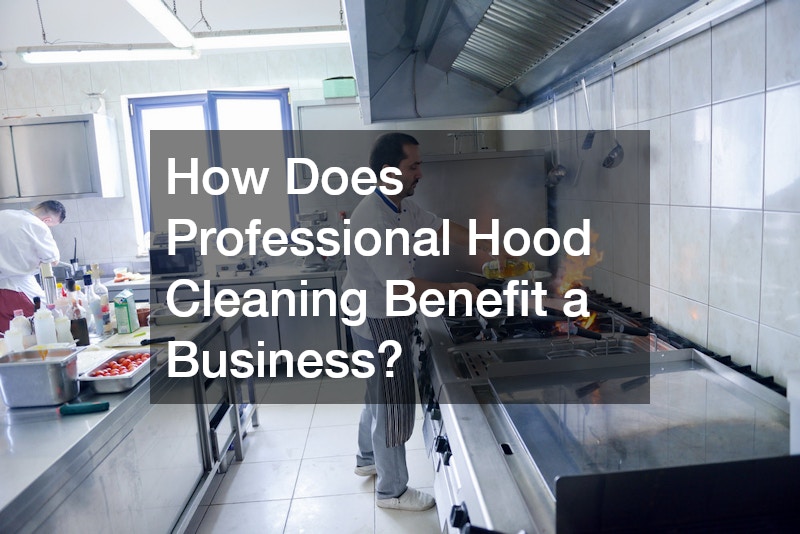This section introduces the crucial role that commercial hood cleaning services play in the culinary and safety sectors. It sets the stage for exploring the various aspects of this vital service industry.
Why is Commercial Hood Cleaning Important for Restaurants?
Ensuring Health and Safety Standards
Regular commercial hood cleaning is integral to maintaining health and safety standards in restaurant kitchens. By removing grease and grime, these services significantly reduce the risk of fires, which are a major hazard in food establishments.
Fire outbreaks due to grease accumulation can have dire consequences both for staff safety and property integrity. Maintaining a routine cleaning schedule helps mitigate these risks and supports compliance with health regulations.
Moreover, clean hoods contribute to a healthier working environment by preventing the buildup of pollutants that can adversely affect employees’ health. As such, investing in professional cleaning services is essential for ensuring a safe kitchen operation.
Impact on Culinary Efficiency
Commercial hood cleaning services play a pivotal role in enhancing kitchen efficiency. Clean ventilation systems improve air quality, ensuring a more pleasant and productive working environment for the culinary team.
With unobstructed airflow, kitchen equipment operates more efficiently, which can result in better food quality and faster service. Consequently, this supports the overall operational success of a restaurant, enhancing customer satisfaction and repeat business.
Moreover, a well-maintained hood system prevents unpleasant odors from lingering, thereby enhancing the dining experience for patrons. Efficient kitchens, supported by regular hood cleaning, directly contribute to a restaurant’s bottom line.
What are the Legal Requirements for Hood Cleaning?
Understanding Local Regulations
Each locality may have specific regulations governing the cleaning of commercial kitchen hoods, making it crucial for restaurant owners to stay informed. Compliance with these regulations not only ensures safety but also protects businesses from legal repercussions.
In many areas, failure to adhere to prescribed hood cleaning frequencies can lead to fines and mandatory shutdowns. Thus, businesses must understand both local and national guidelines to maintain uninterrupted operations.
Partnering with professional hood cleaning services familiar with relevant regulations can be advantageous. These experts can provide guidance and help maintain compliance, avoiding costly legal issues and potential business disruption.
Consequences of Non-compliance
Non-compliance with hood cleaning regulations can have significant consequences for a restaurant’s reputation and financial health. Failing to maintain clean hoods can lead to penalties, fines, and even forced closure by health inspectors.
Negative media coverage and customer perceptions arising from non-compliance can tarnish a restaurant’s reputation, impacting customer loyalty and revenue. Thus, proactive measures in maintaining clean hoods are essential for sustained business operations.
Beyond financial penalties, there is also the risk of insurance claims being denied if a fire or accident occurs due to neglected maintenance. Legal challenges and increased premiums can further strain a business financially.
How Often Should Commercial Hoods Be Cleaned?
Industry Guidelines and Best Practices
Industry experts recommend that the frequency of hood cleaning should be tailored to a restaurant’s specific usage patterns. High-volume establishments, such as those using solid fuel cooking, might require monthly cleanings to prevent excessive grease buildup.
Conversely, lower-volume operations might be sufficiently serviced with quarterly cleanings. Understanding these nuances ensures that kitchen systems remain efficient and compliant with safety regulations.
Adhering to industry best practices not only ensures compliance but also extends the lifespan of kitchen equipment, providing long-term cost savings. The keyword ‘commercial hood cleaning’ is crucial for businesses seeking reliable maintenance solutions.
Monitoring and Scheduling Cleanings
Effective management of hood cleaning schedules is vital for maintaining a restaurant’s operational integrity. Technology, such as maintenance tracking software, can assist restaurant owners in monitoring and scheduling routine cleanings.
By scheduling regular cleanings, businesses can avoid unexpected shutdowns and ensure continuous compliance with health standards. It is imperative for restaurants to partner with reputable cleaning services that can provide reliable timelines and maintenance records.
These collaborations facilitate the development of a customized cleaning schedule that aligns with a kitchen’s specific needs. Structured planning not only ensures compliance but also optimizes a restaurant’s operational performance.
What are the Risks of Neglecting Hood Cleaning?
Fire Hazards and Safety Concerns
Commercial kitchens face significant fire hazards if hood systems are not regularly cleaned. Grease buildup, combined with high cooking temperatures, creates an environment conducive to ignition and fire spread.
Neglecting hood cleaning can compromise the safety of both kitchen staff and patrons. The potential for devastating fire damage underscores the importance of routine maintenance.
In addition to fire risks, failing to clean hoods can result in poor air quality that affects employee health and productivity. Respiratory issues and a hazardous work environment can arise when pollutants are allowed to accumulate unchecked.
Impact on Business Operations
The lack of regular hood cleaning can lead to unexpected operational disruptions and financial setbacks. Fires or equipment failures caused by grease accumulation can result in costly downtime and repair expenses.
Additionally, these incidents can lead to loss of business as repairs are being made, potentially damaging a restaurant’s standing in the marketplace. Therefore, proactive maintenance is crucial to safeguarding continuous business operations.
Neglecting hood cleaning can also burden businesses with increased insurance premiums and potential legal liabilities. These financial implications highlight the necessity for a dedicated cleaning regimen to protect and sustain business longevity.
How Does Professional Hood Cleaning Benefit a Business?
Cost-Effectiveness and Long-term Savings
Professional hood cleaning services offer substantial cost-effectiveness by minimizing the risk of equipment breakdowns and fires. By maintaining well-functioning systems, businesses can avoid the high expenses associated with emergency repairs.
The investment in routine cleaning pays off by extending the lifespan of kitchen equipment, resulting in long-term savings. Preventive maintenance ensures that restaurants run smoothly and profitably.
Enhancing Business Reputation
A commitment to cleanliness through professional hood cleaning services enhances a restaurant’s reputation. Patrons note a visibly clean environment, which translates into trust and customer satisfaction.
Maintaining cleanliness standards is integral to brand image, directly influencing customer loyalty and business growth. Successful restaurants recognize the correlation between hygiene and customer perception, emphasizing the importance of regular hood cleaning.
.

